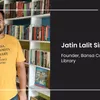[Monday Motivation] How this 19-year-old is empowering underprivileged children through community libraries
Sadiya Shaikh built a community library for underprivileged children in Deora, and saw the difference it made. She now wants to empower children in villages across India through this initiative.
Sadiya Shaikh, 19, a Mumbai resident, decided to take a break and visit her hometown in Deora, Bihar along with her family before the nationwide lockdown was announced in 2020.
Sadiya describes Deora as a small village in Jale Block in Bihar's Darbhanga district- which stands at a total population of 3,446 persons and 631 houses. While the village literacy rate stands at 40.9 percent, the female literacy rate is a staggering 18.6 percent.
On moving back to the village, she realised that families with stronger financial backgrounds migrated to the cities, while others were left behind. She recollected that her own family had moved to Mumbai for better prospects and opportunities when she was a four-year-old.

Sadiya with the children from the village
“I could see that the less privileged families and their children had to make difficult choices for basic facilities. Many families often withdraw their children from schools because they cannot afford to buy books for the prescribed syllabus or even uniforms,” says Sadiya.
An undergraduate student in Sociology and English at Rizvi College in Bandra, Sadiya is also an intelligent speaker. She often spoke at inter-college events on topics including the Right to Education (RTE), women’s empowerment, and unemployment. Her trip to Deora further opened her eyes to the social causes that she felt strongly about.
Lack of education
She noticed that students in Deora were often forced to discontinue their studies and put to work in the fields. “I have witnessed this being passed onto successive generations in many villages, which have resulted in keeping the populace economically and socially backward,” says Sadiya.
She also realised that the practise of child marriage was still rampant in the village, which was leading to many school dropouts. “Some families don’t wish to educate daughters,” she adds, “and other children are forced to work in the fields with parents and siblings.”
After a few months of research, Sadiya sat her family elders down and proposed the idea of starting a library. However, not many in the family appreciated the idea, as they felt Sadiya could make more judicious use of her time.
The young warrior, however, strongly felt that for any social change to be brought about, it’s the privileged and the educated members of the community who need to step up and stand in allyship with the marginalised.
Building the library
For Sadiya, the aim was to bring together youngsters of the village together, in the hope that they could alter the trajectory of the place.

After many discussions, she finally convinced her family, and gained access to a relative’s guesthouse, renovating it with Rs 5,000 - money earned from winning a public-speaking award over the previous two years. Her uncle Akbar Siddique, and cousin Nawaz Rahman, helped her with the work.
The walls in the guesthouse were repainted, the bamboo roof was repaired attached to a crimson tarpauli, lights and a bookshelf were installed, and plastic chairs and a table were put in place. Vivid charts stuck on the walls, on topics as varied as anatomy to transportation to India’s freedom fighters – enlivened the space.
Named after India’s first education minister, the Maulana Azad Library in Deora now houses hundreds of new and secondhand schoolbooks. These were mostly acquired through donations and fundraising.
The community library stocks Bihar School Boards + NCERT syllabus books from Class 1-12, notebooks, comics, and even stationery kits. School children and others in the village can issue these books for use free of cost.
Sadiya also offers coloring and story books to younger children and has subscribed to Hindi and Urdu newspapers.
Additionally, the library also keeps books on history, literature, and other subjects that the village children can read. This is with the aim of encouraging children and young adults in the village to develop a good habit of reading.

According to Sadiya, the library sees over 200 daily visitors from all age groups.
“We also keep degree books (BA, B.Com, B.Sc).In addition, we stock support study material for competitive exam aspirants. We keep trying to secure free subscriptions for charity from various publications,” says Sadiya.
Sadiya helps students fill out admission forms and other supports with any administrative help. Additionally, she conducts awareness workshops and campaigns for women and children to make them aware of their rights, and holds campaigns for employment opportunities as well.
Road ahead
Sadiya now aims to equip the library with computers and internet so the village children can have access to these facilities as well. Although she returned to Mumbai recently, she gets daily updates on the library from her cousin. The library has a mentor to sit in the library and a teacher to help out the children.
Sadiya is now working to organise scholarships for Deora’s children, and hopes to gather a group of volunteers to start libraries in neighboring villages as well.
Going forward, Sadiya wishes to open many more remote community libraries to support children’s education in rural villages. For this, she is raising funds through different crowdfunding platforms such as ImpactGuru.
Edited by Anju Narayanan

![[Monday Motivation] How this 19-year-old is empowering underprivileged children through community libraries](https://images.yourstory.com/cs/5/79900dd0d91311e8a16045a90309d734/Sadiyafeat-1639919461057.jpg?mode=crop&crop=faces&ar=2%3A1&format=auto&w=1920&q=75)
![[Monday Motivation] This law student is encouraging and empowering women to speak up and forge ahead](https://images.yourstory.com/cs/5/79900dd0d91311e8a16045a90309d734/Designppt-1634475492252.jpg?fm=png&auto=format&h=100&w=100&crop=entropy&fit=crop)





